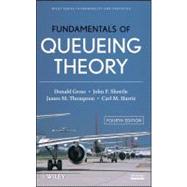
Note: Supplemental materials are not guaranteed with Rental or Used book purchases.
Purchase Benefits
What is included with this book?
Donald Gross, PhD, is Distinguished Research Professor of Operations Research and Engineering at George Mason University and Professor Emeritus of Operations Research at The George WashingtonUniversity. With over forty years of experience in academia and consulting, Dr. Gross has published extensively in the area of queueing applications to repairable item inventory control, air traffic control, and Internet congestion. JOHN F. SHORTLE, PhD, is?Associate Professor in the Department of Systems Engineering and Operations Research at George Mason University. He has authored or coauthored over thirty published articles on the application of simulation and queueing theory in telecommunications and aviation. JAMES M. THOMPSON is an Enterprise Architect at the Federal Home Loan Mortgage Corporation. His current areas of research interest include computer system performance modeling, system capacity studies and benchmarking, information architecture, and computational finance. The Late CARL M. HARRIS, PhD, was BDM International Professor and the founding chair of the Systems Engineering and Operations Research Department at George Mason University. For his research contributions to the areas of applied probability and statistics, queueing theory, simulation, and public systems analysis, Dr. Harris was awarded the George E. Kimball Medal by the Institute for Operations Research and the Management Sciences (INFORMS) in 1999.
| Dedication | p. v |
| Preface | p. xi |
| Acknowledgments | p. xiii |
| Introduction | p. 1 |
| Description of the Queueing Problem | p. 2 |
| Characteristics of Queueing Processes | p. 3 |
| Notation | p. 7 |
| Measuring System Performance | p. 8 |
| Some General Results | p. 9 |
| Simple Data Bookkeeping for Queues | p. 12 |
| Poisson Process and the Exponential Distribution | p. 16 |
| Markovian Property of the Exponential Distribution | p. 20 |
| Stochastic Processes and Markov Chains | p. 24 |
| Introduction to the QtsPlus Software | p. 40 |
| Problems | p. 41 |
| Simple Markovian Queueing Models | p. 49 |
| Birth-Death Processes | p. 49 |
| Single-Server Queues (M/M/1) | p. 53 |
| Multiserver Queues (M/M/c) | p. 66 |
| Choosing the Number of Servers | p. 73 |
| Queues with Truncation (M/M/c/K) | p. 76 |
| Erlang's Loss Formula (M/M/c/c) | p. 81 |
| Queues with Unlimited Service (M/M/[infinity]) | p. 84 |
| Finite-Source Queues | p. 85 |
| State-Dependent Service | p. 91 |
| Queues with Impatience | p. 95 |
| Transient Behavior | p. 97 |
| Busy-Period Analysis | p. 102 |
| Problems | p. 103 |
| Advanced Markovian Queueing Models | p. 117 |
| Bulk Input (M[superscript X]/M/1) | p. 117 |
| Bulk Service (M/M[superscript Y]/1) | p. 123 |
| Erlangian Models | p. 128 |
| Priority Queue Disciplines | p. 141 |
| Retrial Queues | p. 157 |
| Problems | p. 171 |
| Networks, Series, and Cyclic Queues | p. 179 |
| Series Queues | p. 181 |
| Open Jackson Networks | p. 187 |
| Closed Jackson Networks | p. 195 |
| Cyclic Queues | p. 209 |
| Extensions of Jackson Networks | p. 210 |
| Non-Jackson Networks | p. 212 |
| Problems | p. 214 |
| General Arrival or Service Patterns | p. 219 |
| General Service, Single Server (M/G/1) | p. 219 |
| General Service, Multiserver (M/G/c/[infinity], M/G/[infinity]) | p. 254 |
| General Input (G/M/1, G/M/c) | p. 259 |
| Problems | p. 270 |
| General Models and Theoretical Topics | p. 277 |
| G/E[subscript k]/1, G[superscript k]/M/1, and G/PH[subscript k]/1 | p. 277 |
| General Input, General Service (G/G/1) | p. 284 |
| Poisson Input, Constant Service, Multiserver (M/D/c) | p. 294 |
| Semi-Markov and Markov Renewal Processes in Queueing | p. 296 |
| Other Queue Disciplines | p. 301 |
| Design and Control of Queues | p. 306 |
| Statistical Inference in Queueing | p. 317 |
| Problems | p. 325 |
| Bounds and Approximations | p. 329 |
| Bounds | p. 330 |
| Approximations | p. 343 |
| Network Approximations | p. 356 |
| Problems | p. 367 |
| Numerical Techniques and Simulation | p. 369 |
| Numerical Techniques | p. 369 |
| Numerical Inversion of Transforms | p. 385 |
| Discrete-Event Stochastic Simulation | p. 398 |
| Problems | p. 421 |
| References | p. 427 |
| Symbols and Abbreviations | p. 439 |
| Tables | p. 447 |
| Transforms and Generating Functions | p. 455 |
| Laplace Transforms | p. 455 |
| Generating Functions | p. 462 |
| Differential and Difference Equations | p. 467 |
| Ordinary Differential Equations | p. 467 |
| Difference Equations | p. 483 |
| QtsPlus Software | p. 489 |
| Instructions for Downloading | p. 493 |
| Index | p. 495 |
| Table of Contents provided by Ingram. All Rights Reserved. |
The New copy of this book will include any supplemental materials advertised. Please check the title of the book to determine if it should include any access cards, study guides, lab manuals, CDs, etc.
The Used, Rental and eBook copies of this book are not guaranteed to include any supplemental materials. Typically, only the book itself is included. This is true even if the title states it includes any access cards, study guides, lab manuals, CDs, etc.